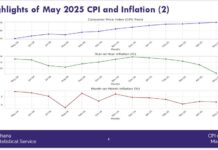For many young people, the idea of saving for retirement seems like something that needs to be done only when one is much older, more settled, or has paid off debts. But we hear the scary statistics highlighting that only 2 percent of Ghanaians can afford to retire financially independent.
That is a truly worrying statistics and something that needs to be changed for the better over time. Financial independence is defined as not needing financial support from family, friends, or the government.
The big question is when should a person start saving and investing for retirement? The answer is simple, the sooner the better. The Head of Global Markets at First National Bank, Kofi Pianim, shared that contributing even a small amount to retirement savings now can be very beneficial in the long run.
He explains with an example of why it is better to start earlier to save for retirement, rather than later. “Let’s consider the typical example of Mr. Bankson who is targeting a lump sum of GH¢2,000,000 at retirement to give him a sustainable income of GH¢6,666.67 every month after retirement till age 85.
Assumptions:
| Retirement Goal: GH¢2,000,000 | Current retirement Savings: Nil |
| Return on investment: 19 percent (Policy Rate) | Retirement Age: 60 |
| HOW MUCH SHOULD YOU SAVE PER MONTH? | ||
| Retirement Saving Starting Age | Monthly contribution required (GH¢) | Additional Savings Required as a result of Delay |
| 20 | 27.80 | |
| 30 | 158.99 | 131.19 |
| 40 | 929.17 | 770.18 |
| 55 | 21,064.88 | 20,135.70 |
*Numbers are for illustration purposes only and in real terms or ‘today’s money’
From the above, if one starts saving for retirement at age 20, GH¢27.80 is to be saved every month till retirement. If this decision to start saving is delayed by another 10 years (starts at age 30), GH¢158.99 is required to be saved every month. At age 55, GH¢21,064.88 is needed to be saved each month.
The moral here is that the earlier a person starts saving for retirement, the more they can benefit on the effects of compound interest. This means that the interest earns interest over a long period of time. Kofi shared a few things that one needs to consider when it comes to retirement:
- What are your retirement goals, and how much do you need for those goals?
For example, someone who wants to regularly travel in retirement will need more in retirement than someone that wants to be stay-at-home.
- Continue to budget in retirement
Critically look at your budget now and see how many of those expenses will carry on into retirement. For example, groceries will continue into retirement but traveling to work and back will not.
- Make provision for increased medical cover and expenses in retirement
Getting older generally means more medical expenses; ensure that you work that into the budget. Medical inflation is notoriously higher compared to consumer price inflation; therefore, you need to take this into account.
- Make sure that you invest in the right solution for the right time horizon
Solutions you invest in need to be appropriate for your needs. Some solutions protect you against the risk of outliving your pension, and other solutions don’t give you protection against longevity risk but provide you with flexibility on the income that you select annually. Do your research and get advice from appropriately qualified and registered financial service providers.
- Preserve your retirement savings
When you change an employer and have a pension fund from the previous employer, preserve your retirement savings in one of the vehicles that are available like a preservation fund or the new employers pension fund. The reason why most people do not retire comfortably is because they do not preserve their pension when changing jobs. This will help toward the effect of compound interest, and is a good practice in the long run.
The next step is freeing up cash to contribute toward your retirement goals. Get back to the basics of checking your budget and see where you are spending your money. “Using a tool that tracks your spend will give you an indication of what you are spending on and where possible, help you to redirect some funds to your retirement savings if you have an allocation of a sort,” Kofi added. First National Bank has a wide array of savings and investment banking offers available; Life Start, Savings, Fixed Deposits, Treasury, Transmission, and Call Accounts.










